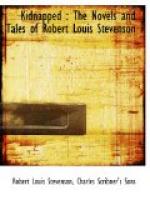“Has he nae friends?” said she, in a tearful voice.
“That has he so!” cried Alan, “if we could but win to them!—friends and rich friends, beds to lie in, food to eat, doctors to see to him—and here he must tramp in the dubs and sleep in the heather like a beggarman.”
“And why that?” says the lass.
“My dear,” said Alan, “I cannae very safely say; but I’ll tell ye what I’ll do instead,” says he, “I’ll whistle ye a bit tune.” And with that he leaned pretty far over the table, and in a mere breath of a whistle, but with a wonderful pretty sentiment, gave her a few bars of “Charlie is my darling.”
“Wheesht,” says she, and looked over her shoulder to the door.
“That’s it,” said Alan.
“And him so young!” cries the lass.
“He’s old enough to——” and Alan struck his forefinger on the back part of his neck, meaning that I was old enough to lose my head.
“It would be a black shame,” she cried, flushing high.
“It’s what will be, though,” said Alan, “unless we manage the better.”
At this the lass turned and ran out of that part of the house, leaving us alone together. Alan in high good humour at the furthering of his schemes, and I in bitter dudgeon at being called a Jacobite and treated like a child.
“Alan,” I cried, “I can stand no more of this.”
“Ye’ll have to sit it then, Davie,” said he. “For if ye upset the pot now, ye may scrape your own life out of the fire, but Alan Breck is a dead man.”
This was so true that I could only groan; and even my groan served Alan’s purpose, for it was overheard by the lass as she came flying in again with a dish of white puddings and a bottle of strong ale.
“Poor lamb!” says she, and had no sooner set the meat before us, than she touched me on the shoulder with a little friendly touch, as much as to bid me cheer up. Then she told us to fall to, and there would be no more to pay; for the inn was her own, or at least her father’s, and he was gone for the day to Pittencrieff. We waited for no second bidding, for bread and cheese is but cold comfort and the puddings smelt excellently well; and while we sat and ate, she took up that same place by the next table, looking on, and thinking, and frowning to herself, and drawing the string of her apron through her hand.
“I’m thinking ye have rather a long tongue,” she said at last to Alan.
“Ay” said Alan; “but ye see I ken the folk I speak to.”
“I would never betray ye,” said she, “if ye mean that.”
“No,” said he, “ye’re not that kind. But I’ll tell ye what ye would do, ye would help.”
“I couldnae,” said she, shaking her head. “Na, I couldnae.”
“No,” said he, “but if ye could?”
She answered him nothing.




